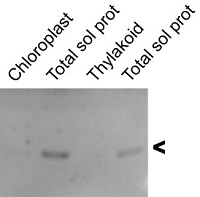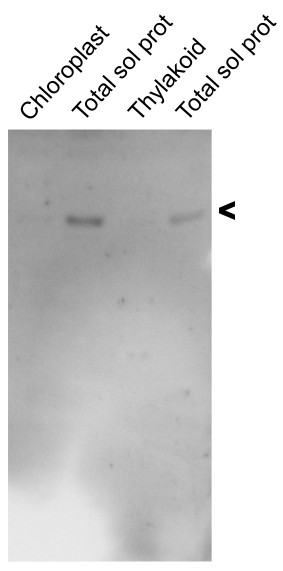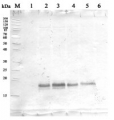1

Anti-Lysine-tRNA ligase
AS15 2899 | Clonality: Polyclonal | Host: Rabbit | Reactivity:Arabidopsis thaliana
- Product Info
-
Immunogen: KLH-conjugated synthetic peptide derived from Lysine-tRNA ligase protein sequence of Arabidopsis thaliana UniProt: Q39101, TAIR: AT3G01060
Host: Rabbit Clonality: Polyclonal Purity: Serum Format: Lyophilized Quantity: 100 µl Reconstitution: For reconstitution add 100 µl of sterile water Storage: Store lyophilized/reconstituted at -20°C; once reconstituted make aliquots to avoid repeated freeze-thaw cycles. Please remember to spin the tubes briefly prior to opening them to avoid any losses that might occur from material adhering to the cap or sides of the tube. Tested applications: Western blot (WB) Recommended dilution: 1 : 500 (WB) Expected | apparent MW: 41 kDa
- Reactivity
-
Confirmed reactivity: Arabidopsis thaliana
- Application Examples
-
Application example
20 μg of protein from Arabidopsis thylakoids or chloroplasts were separated on 12 % SDS-PAGE and blotted 1h to nitrocellulose membrane using tank transfer. Blots were blocked with 10% Milk for 1h at room temperature (RT) with agitation. Blot was incubated in the primary antibody at a dilution of 1: 500 overnight with agitation. The antibody solution was decanted and the blot was rinsed briefly twice, then washed three times for 15 min in TBS-T at RT with agitation. Blot was incubated in secondary antibody (anti-rabbit IgG horseradish peroxidase conjugated, AS09 602 Agrisera ) diluted to 1: 8 000 in TTBS for 1h at RT. The blot was washed as above and developed for 5 min with ECL according to the manufacturer's instructions. Exposure time was 3 minute.
Total soluble proteins (stroma) extracted from 0.2 g leaf by homogenization in a buffer containing 20 mMTris-HCl, pH 9.0, 250m MNaCl, 50m MNaHCO3, 4mMMgCl2, and an EDTA-free protease inhibitor cocktail (Roche). After removal of cell debris by centrifugation for 5min at 13,000g and 4°C, a volume corresponding to 10 μg of protein was loaded on12% SDS-PAGE and blotted as descried above.Courtesy of Dr. Rikard Fristedt, VU University Amsterdam, The Netherlands
- Additional Information
-
Additional information (application): This protein is present in very low levels, therefore western blot conditions need to be adjusted by higher protein load/well and usage of a very sensitive detection system - Background
-
Background: Lysine-tRNA ligase is located in chloroplast and involved in circadian rhytm. - Protocols
-
Agrisera Western Blot protocol and video tutorials
Protocols to work with plant and algal protein extracts - Reviews:
-
This product doesn't have any reviews.


